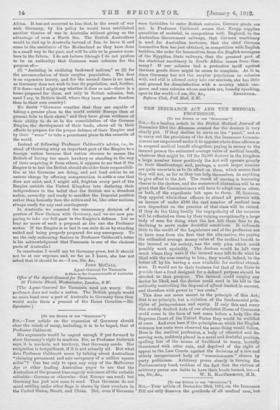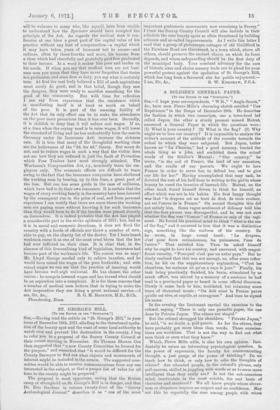[To TIIR EDITOR Or TIIR " SPECTATOR...I
SIR,âYour article of December 23rd, 1911, on the Insurance Bill not only deserves the gratitude of all medical men, but will be welcome to many who, like myself, have been unable to understand how the Spectator should have accepted the principle of the Act. As regards the medical man it con- fiscates at one blow a great part of the capital value of his practice 'without any hint of compensationâa capital which it may have taken years of incessant bail to amassâand reduces, often by three-fourths and more, his income from a class which had cheerfully and gratefully paid fees graduated to their income. In a word it makes him poor and trades on his needs. If when you say that medical men are not busi- ness men you mean that they have never forgotten that theirs is a profession, and aims first at duty, you say what is certainly true. At first the vast body believed a Bill of such aspirations must surely do good; and in that belief, though they saw the dangers, they were ready to sacrifice something for the good of the community. But with time for reflection I can say from experience that the resistance which is manifesting itself is at least as much on behalf of the poor. It is part of the amazing futility of the Act that its only effect can be to make the attendance on the poor more precarious than it has ever been. Secondly, it is childish to deny that it will reduce real wages. If so, at a time when the crying need is to raise wages, it will lower the standard of living and (as has undoubtedly been the case in Germany under its Insurance Act) increase the sickness rate. It is true that many of the thoughtful working class see the hollowness of the "9d. for 4d." theory. But many do not, and to reduce wages in such a way that the victim does not see how they are reduced is just the fault of Protection which Free Traders have most strongly attacked. The Workmen's Compensation Act, e.g., nominally taxes the em- ployers only. The economic effects are difficult to trace owing to the fact that the insurance companies have sheltered the working man by bearing, up to this time, a great part of the loss. But one has some guide in the case of collieries, which have had to do their own insurance. It is certain that the wages of every working family in the country have been lowered by the consequent rise in the price of coal, and from personal experience I can testify that there are cases where the working men are paying more without knowing it for such insurance than they would have to do if the burden were placed directly on themselves. It is indeed probable that the Act has played a considerable part in the strike epidemic of 1911; but, bad as it is in moral and economic directions, it does not flood the country with a horde of officials nor throw a number of men, able to pay, on the charity list of the doctor. Yet I have heard workmen curse it as one of the most cruel blows that the law had ever inflicted on their class. It is clear that, in the absence of this demoralizing kind of legislation, insurance had become part of the workman's life. The course was so easy! Mr. Lloyd George needed only to relieve taxation, and he would have raised the wages of the poor forthwith ; and with
raised wages we can see that the practice of insuring would have become well-nigh universal. He has chosen the other course : he compels lowered wages and has turned what should be an aspiration into a complaint. It is for these reasons that a number of medical men believe that in trying to make the Act inoperative they are doing a great national service.âI



















































 Previous page
Previous page